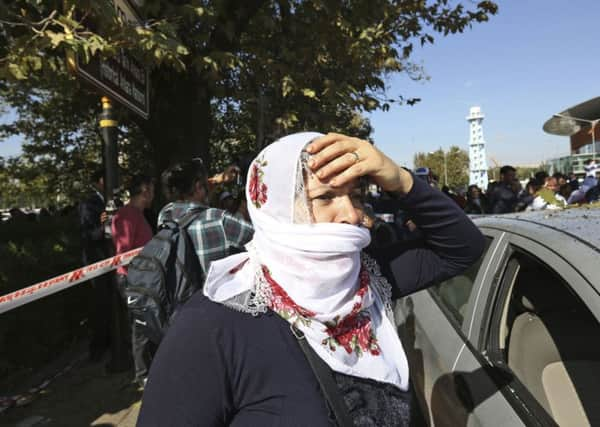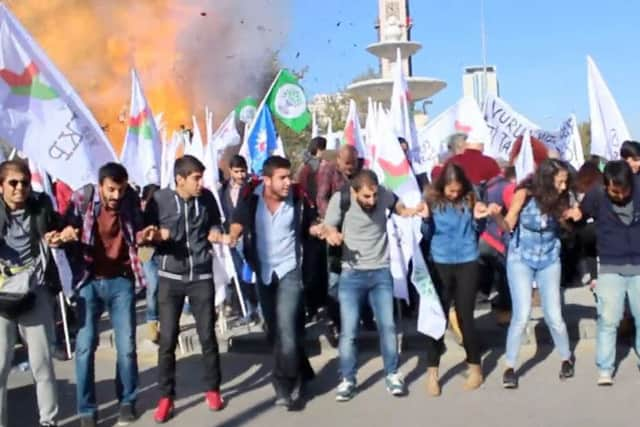Blasts at pro-Kurdish rally kill 86 in Ankara, Turkey


The explosions occurred minutes apart near Ankara’s main train station as people were gathering for the rally, organised by the country’s public sector workers’ trade union and other civic society groups. The rally aimed to call for an end to the renewed violence between Kurdish rebels and Turkish security forces. The pro-Kurdish HDP party was among those attending the rally.
The leader of the HDP has blamed the state for the attack, which he called “a huge massacre”, and cancelled all election rallies. The HDP tweeted that police “attacked” people carrying the injured away.
Advertisement
Hide AdAdvertisement
Hide AdOpposition MP Musa Cam tweeted a photo of a ball bearing he says he found at the scene.


Selahattin Demirtas, co-chair of the HDP party, said : “We are witnessing a massacre here. A cruel and barbarian attack was carried out. The death toll is high.”
It was not clear if the attacks, which came weeks before Turkey’s 1 November elections, were suicide bombings.
A photographer at the scene reported seeing several bodies that were covered with flags and banners that demonstrators had brought with them for the rally. Police later cordoned off the area. Television footage from Turkey’s Dogan news agency showed a line of protesters fanned out on the street near the train station, chanting and performing a traditional dance with their hands locked, when a large explosion hit behind them.
The video also showed several people lying injured on the streets or being taken into ambulances.
An Interior Ministry statement condemned the attack which it said “targets Turkey’s democracy and peace”. Prime Minister Ahmet Davutoglu called an emergency security meeting to discuss the attack. His office said he was suspending his election campaign programmes for the next three days.
The renewed conflict in the south-east has raised questions over how Turkey can hold a free and fair election in violence-hit areas but the government has so far insisted that the vote will go ahead.
President Recep Tayyip Erdogan cut short his programme in Istanbul to return to the capital.
Advertisement
Hide AdAdvertisement
Hide AdErdogan called for “solidarity and determination as the most meaningful response to terror” and said that those behind the attack aimed to sow division between sections of society.
Witnesses said the blasts were seconds apart shortly after 10am and were so powerful they rocked nearby high-rise buildings.
Some people said ambulances could not immediately reach the scene of the attack, and that police obstructed the quick evacuation of the wounded from the square. A Turkish MP, Sirri Süreyya Önder, claimed a suspicious vehicle and another suspicious package had been found and that bomb disposal experts had been called to the scene.
“There was a massacre in the middle of Ankara,” said Lami Ozgen, head of the Confederation of Public Sector Trade Unions, or KESK. “Two bombs exploded in very short intervals.”
There was no immediate responsibility claim. A government official said authorities were investigating the blast.
“The toll is severe,” said Selahattin Demirtas, leader of Turkey’s pro-Kurdish party, whose members attended the rally. “There are dozens of dead and hundreds of injuries. Some of our friends are in serious condition.”
In June polls, the AKP lost the overall majority it had held since 2002, partly because of the electoral success of a pro-Kurdish political party, the HDP, which party founder Erdogan accuses of links to the militant PKK or Kurdistan Workers Party. The HDP denies the accusation.
In July, a suicide bombing by suspected Islamic State militants on a gathering of Socialist youth activists in the town of Suruc on the Syrian border killed at least 30 people.
Advertisement
Hide AdAdvertisement
Hide AdA ceasefire between the PKK and Turkey’s government later broke down, and there have been regular attacks from both sides since then.
The country has been in a heightened state of alert since starting a “synchronised war on terror” in July, including air strikes against Islamic State fighters in Syria and PKK bases in northern Iraq. It has also rounded up hundreds of suspected militants at home.
Designated a terrorist group by Turkey, the US and the European Union, the PKK launched a separatist insurgency in 1984 in which more than 40,000 people have been killed.
The state launched peace talks with the PKK’s jailed leader in 2012 and the latest in a series of ceasefires had been holding until the violence flared again in July.
Writing in a Kurdish newspaper this week, senior PKK figure, Bese Hozat, hinted at a cessation of hostilities as a way of bolstering the chances of the HDP in the upcoming election.
But Deputy Prime Minister Yalcin Akdogan on Thursday dismissed any such move as an electoral gambit, pouring cold water on hopes of an imminent end to the violence.